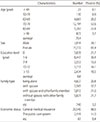Abstract
Background
With the increasing elderly population in Korea, the number of dementia patients is estimated to reach nearly a million by 2027. To resolve this problem, centers for dementia were established in Korea since 2007 and mass screening for dementia proceeded in these center. This research was the analysis of the results of mass screening in Seongdong-gu center for dementia.
Methods
From July 2007 to December 2013, we registered 23,186 persons at Seongdong-gu center for dementia and all individuals were aged 60 and older. They classified the subjects into cognitive impairment group and normal group by Korean version Mini-Mental State Examination (K-MMSE). Next, the cognitive impairment group was assorted by Consortium to Establish a Registry for Alzheimer's Disease Korean version (CERAD-K) and the examination of two neurologists. We investigated the prevalence of dementia and the usefulness mass screening of dementia among that data.
Results
A total of 23,186 subjects were enrolled, of which 3,286 were cognitive impairment group, and 1,856 were diagnosed with dementia finally. The mean age was 77.1 years, 67% were female and the mean education level was 6.3 years. Disease incidence of dementia was lower year by year, but this went up when we focused the group who has high risk of dementia. Especially, the sharp decline was observed in complete enumeration dementia screening test about the specific age group.
Figures and Tables
References
2. The Ministry of Health Wefare and Family Affairs. Nationwide study on the prevalence of dementia in Korean elders. Seoul: The Ministry;2008.

3. Park HK, Na DL, Han SH, Kim JY, Cheong HK, Kim SY, et al. Clinical Characteristics of a Nationwide Hospital-based Registry of Mild-to-Moderate Alzheimer's Disease Patients in Korea: a CREDOS (Clinical Research Center for Dementia of South Korea) study. J Korean Med Sci. 2011; 26:1219–1226.

4. UK National Screening Committee. Alzheimer's disease: the UK NSC policy on Alzheimer's disease screening in adults. 2010. www.screening.nhs.uk/alzheimers.

5. Brunet MD, McCartney M, Heath I, Tomlinson J, Gordon P, Cosgrove J, et al. Open letter to the prime minister and chief medical officer for England. There is no evidence base for proposed dementia screening. BMJ. 2012; 345:e8588.

6. Department of Health. Policy improving care for people with dementia. 2013. www.gov.uk/government/policies/improving-care-for-people-with-dementia.

7. Chinthapalli K. Reward doctors for early diagnosis of dementia, says think tank. BMJ. 2012; 345:e8533.

8. Kang Y, Kim D, Na DL. A normative study of the Korean Mini-Mental State Examination. J Korean Neurol Assoc. 2003; 22:Suppl 3. 235.

9. Choi H, Kim HJ, Park KB, Park HM, Kim SH. The Results of Complete Enumeration Survey of the Cognitive Screening Test in the People Aged 60 and Older in Absolute Poverty of the Local Community. Dement Neurocogn Disord. 2011; 10:112–116.

10. Yoon B, Shim YS, Kim YD, Lee KO, Na SJ, Hong YJ, et al. Who Takes Care of Patients with Dementia in Korea: A Study on the Present State of Patients with Dementia Living Alone and Primary Caregivers. Dement Neurocogn Disord. 2012; 11:13–17.

11. Ritchie K, Kildea D. Is senile dementia "age-related" or "ageing-related"?-evidence from meta-analysis of dementia prevalence in the oldest old. Lancet. 1995; 346:931–934.

13. Le Couteur DG, Doust J, Creasey H, Brayne C. Political drive to screen for pre-dementia: not evidence based and ignores the harms of diagnosis. BMJ. 2013; 347:f5125.

14. Meeuwsen EJ, Melis RJ, Van Der Aa GC, Goluke-Willemse GA, De Leest BJ, Van Raak FH, et al. Effectiveness of dementia follow-up care by memory clinics or general practitioners: randomised controlled trial. BMJ. 2012; 344:e3086.

16. Masoodi N. Review: cholinesterase inhibitors do not reduce progression to dementia from mild cognitive impairment. Ann Intern Med. 2013; 158:JC2–JC3.

17. Gill SS, Anderson GM, Fischer HD, Bell CM, Li P, Normand SL, et al. Syncope and its consequences in patients with dementia receiving cholinesterase inhibitors: a population-based cohort study. Arch Intern Med. 2009; 169:867–873.

18. Winblad B, Gauthier S, Scinto L, Feldman H, Wilcock GK, Truyen L, et al. Safety and efficacy of galantamine in subjects with mild cognitive impairment. Neurology. 2008; 70:2024–2035.

19. Le Couteur DG, Robinson M, Leverton A, Creasey H, Waite L, Atkins K, et al. Adherence, persistence and continuation with cholinesterase inhibitors in Alzheimer's disease. Australas J Ageing. 2012; 31:164–169.





 PDF
PDF ePub
ePub Citation
Citation Print
Print






 XML Download
XML Download